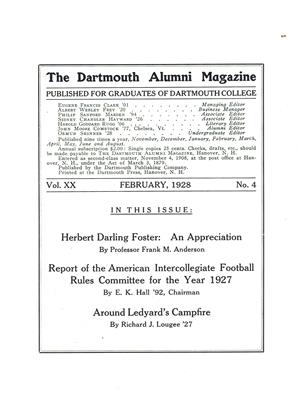Soon after vacation The Dartmouth published in four successive issues criticisms of a large number of courses written by the students themselves. In December a questionnaire was distributed among the undergraduates asking for criticisms of courses and professors. The criticisms of professors were so contradictory that it would have taken a liar greater than Ananias to have evolved anything worthwhile from the mass of comments, and, rather than degenerate into a mere gossip bulletin, The Dartmouth omitted them. The criticisms of courses, which were printed, were derived directly from the tabulated comments of the questionnaire, and served as a mirror of students opinion.
Commenting editorially on its survey of courses, The Dartmouth said that the survey "shows the students' attitude toward their work. 'Not as interesting as he might be,' 'No originality,' 'An excellent place to use the trot,' 'Too many formulae,' 'Excellent filler.' Apparently one of the highest compliments a student can pay to an instructor is that his course is interesting. One well known and well liked for his 'fairy tales,' and many are known by the jokes they tell. The professor that can put over the biggest show, and permit the least work is bound to have a popular course. The chapel committee appreciated the students' unwillingness to think and recently decided to adopt a policy of soothing music instead of annoying tirades for the morning chapel.
"If you talk to a very old graduate he will probably tell you of his favorite professor. If you talk to one that is under forty he will tell you of class fights or thrilling moments in big games.
"Far different are the colleges of today from the ascetic societies of scholars from which they have sprung. It is good that they are. We have no quarrel with entertaining courses. We like them. But we warn against the entertainment of a college education becoming so prominent as to crowd out the education itself, and the American college becoming a playground for adolescent intellects of the plumber class."
The announcement of the gift to the College of a new Fine Arts Building drew forth the following comment from The Dartmouth.
"Slowly, but very surely, the Dartmouth of tomorrow is appearing upon the horizon. With the announcement of the gift of a new Fine Arts building, donated by Mr. Frank P. Carpenter, of Manchester, New Hampshire, another badly needed requisite to the institution that Dartmouth some time will be, becomes a surety. Mr. Carpenter is not an alumnus of the College. This fact assumes striking proportions when we realize that its existence sets the standard for a new era in constructional faith. The alumni of this college have, to a great extent, made its continued existence possible. Dartmouth may feel justly proud in knowing that her traditions, because of their real worth, have spread, in their continued growth to the boundaries of Alumniania and beyond.
"With the end of every year the ultimate goal, the new Dartmouth, becomes clearer and finer. With the end of every year those things that have made such a goal possible assume an aspect of aloofness... .we speak now, with bowed head and trembling lip of the present home of the Fine Arts, Culver. Like as undead Victoria it rests itself upon the hill and smiles, with much the same sort of satisfaction as is often shown in the face of an old and worn out washerwoman... .it's ugly, and it knows it, but in its day there have been some grand moments."
 View Full Issue
View Full Issue
More From This Issue
-
 Sports
SportsREPORT OF THE AMERICAN INTERCOLLEGIATE FOOTBALL RULES COMMITTEE FOR THE YEAR 1927
February 1928 By E. K. Hall '92 -
 Lettter from the Editor
Lettter from the EditorEditorial Comment
February 1928 -
 Article
ArticleHERBERT DARLING FOSTER An Appreciation
February 1928 By Frank M. Anderson -
 Class Notes
Class NotesClass of 1918
February 1928 By Frederick W. Cassebeer -
 Class Notes
Class NotesClass of 1921
February 1928 By Herrick Brown -
 Article
ArticleCOLLEGE NEWS
February 1928








